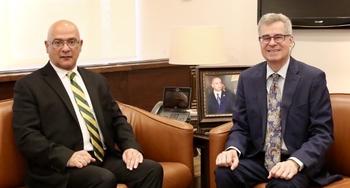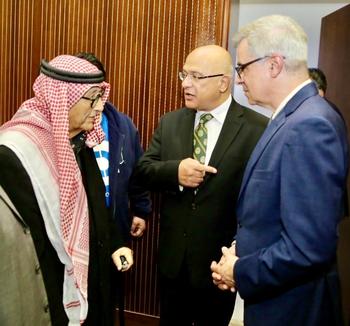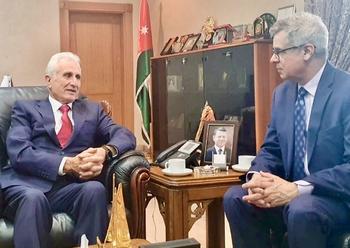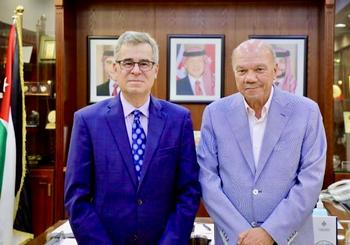In This Story

The ancient country of Jordan is situated in one of the most challenging, volatile regions in the world. It also has serious domestic problems: It suffers low economic growth rates, increasing national debt, high youth unemployment, meager water resources, and noticeable income disparity.
And yet, said Schar School of Policy and Government Dean Mark J. Rozell, “It is remarkable that the country has such an impressive internal political stability.”
That was one of Rozell’s takeaways during a seven-day June tour of Jordan that saw the dean, on his first visit to the country, deliver lectures that were attended by political dignitaries, academics, and business leaders eager to hear his insights about developments in the U.S. and the world. For his part, Rozell was equally eager to learn more about Jordan.
The visit was coordinated by Maen F. Nsour, president and CEO of the Arab Potash Company (APC), a 2,000-employee company with annual revenue of about $2.4 billion. Nsour is a 1998 graduate of George Mason University, having earned a PhD in Public Policy from the Institute of Public Policy (TIPP), now the Schar School of Policy and Government.

Nsour, a former chief of staff and special adviser to the Jordanian prime minister, is also the former general director of the Jordanian Social Security Corporation, former CEO of the Jordan Investment Board, and a former senior program advisor at the United Nations Development Programme in New York.
Rozell’s visit, Nsour said, was to create a pathway for the Schar School to join other academic institutions and think tanks that have realized the significance of the Arab World and the Middle East and sought to understand the politics and the socio-economics of the region. “A good number of those schools established operations in the Arab World and built bridges so that their students can become well-versed with the region,” said Nsour. He added that in 2010 he hosted Mason president Alan Merten on a similar tour.

Rozell's program in the country included meetings with high-ranking officials. Over the course of several days, he met with the president of the Jordanian Senate; the president of the House of Representatives; the chairman of the influential Economic and Finance Committee at the Senate; the Minister of Education and Higher Education and Scientific Research; the president of the University of Jordan; the director of the Center for Strategic Studies; and the chairman of APC.
Nsour said Rozell’s lectures at the Center for Strategic Studies at the University of Jordan and at the Council for Foreign Affairs “were very well attended and brought fresh perspectives on the issues discussed.” They also inspired lively discussions afterward, he added.
Nsour, the 2010 Alumnus of the Year, attended Mason as a Thomas Jefferson Fellow and was sponsored by the United States Agency for International Development (USAID). He recalled his time at Mason, from 1992 to 1998, as being “the most enjoyable, fruitful, and rewarding years of my life. The course work was extremely rich and provided me with solid academic and policy-making grounds. The fact that I was studying with the best in the field of political economy and governance was fulfilling, rewarding, and gratifying.”

Among his professors were Francis Fukuyama, who published the groundbreaking The End of History and The Last Man in 1992 (he now directs the international policy program at Stanford University); the late Seymour Martin Lipset, ex-president of the American Political Science Association; and Roger Stough and Kingsley Haynes, two co-founders of Mason’s TIPP
In the end, Rozell said his visit reinforced his belief that it’s vital that Jordan continue to receive international support.
“The country depends heavily on foreign aid, particularly from the U.S., and from some of the Gulf states, to be able to sustain itself during such difficulties” as it is encountering now, he said. “The U.S. has a distinct interest in doing so given that Jordan is an important ally in a highly unstable region of the world.”
Nsour added that he is helping coordinate a new Schar School program in May 2023 that will send up to 18 Mason students to Jordan for a three-week intensive course, with a stint at the University of Jordan in Amman.
